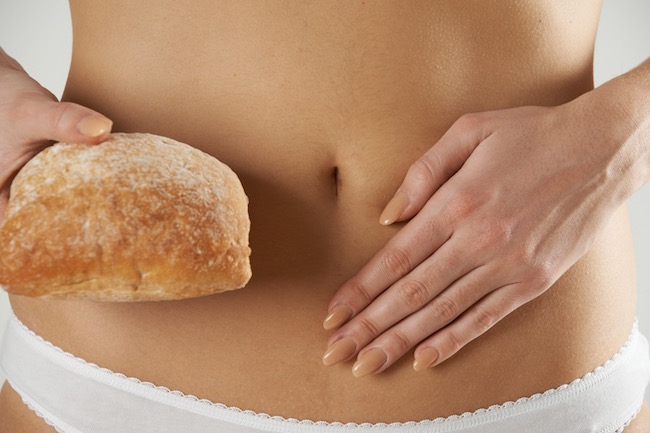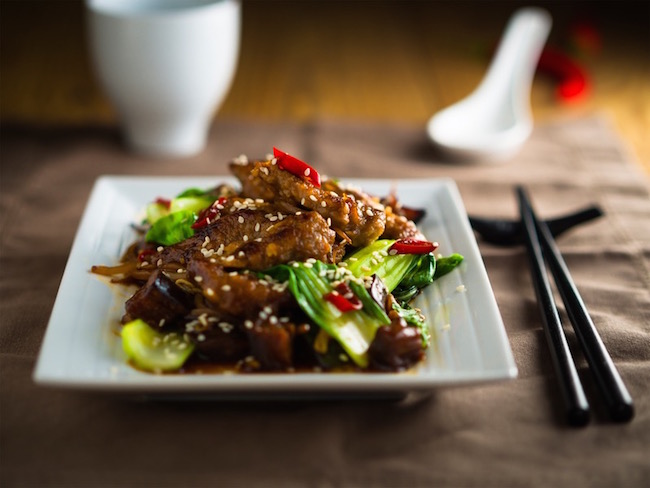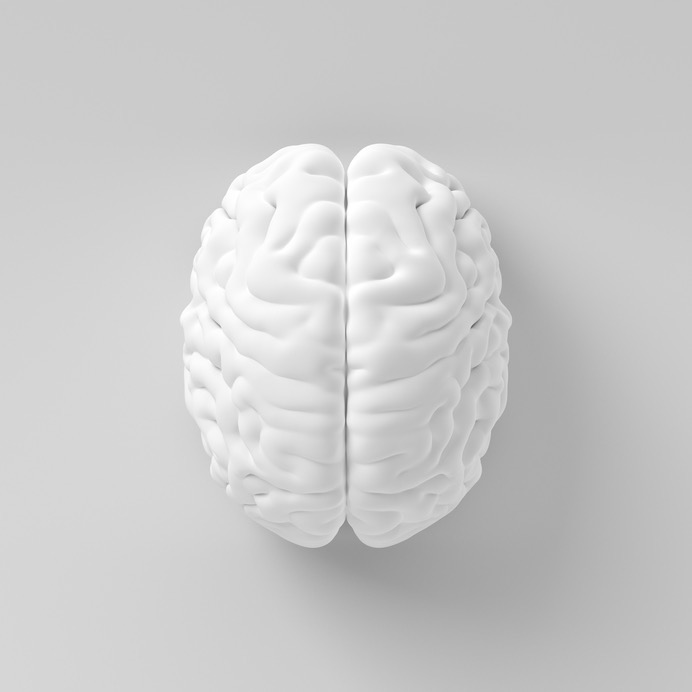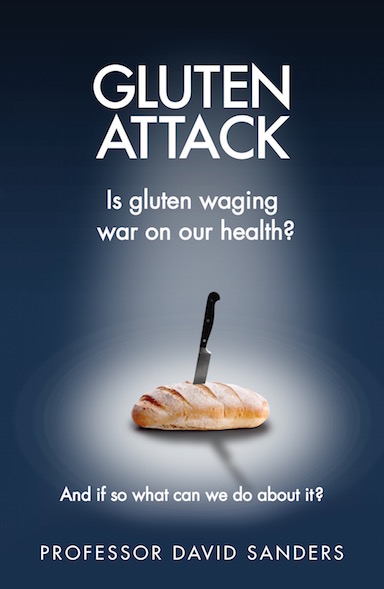Miley Cyrus, Victoria Beckham and Gwyneth Paltrow are amongst the list of celebrities who have given up the gluten, and with the gluten-free market on the rise it makes us wonder – is it really necessary to kick it? Professor David Sanders explains
Last month fashion retailer Zara was forced to withdraw its ‘Are you gluten-free?’ T-shirts after 50,000 people signed a petition accusing the brand of trivialising coeliac disease, an illness in which sufferers have an intolerance to foods containing gluten. It’s symptomatic of what Professor David Sanders calls the ‘gluten explosion’.
A gastroenterologist at the Royal Hallamshire Hospital in Sheffield, Prof. Sanders has spent the last 20 years studying gluten and its effects.

In population-based studies he’s found increasing numbers cutting out gluten because they may have indeed have been diagnosed with coeliac disease. Or, they may have tested negative to coeliac disease but still experience ‘gluten sensitivity’, reporting symptoms not just limited to the gut such as diarrhoea, constipation and bloating but also mouth ulcers, depression, confusion, skin rashes and fatigue. Others on the other hand, are cutting gluten because it’s fashionable.
’There are people making choices to avoid gluten without ever having had any symptoms from eating it,’ he says. Sanders calls these the ‘Lifestylers’ and says the choice is fuelled by an ever-growing roll-call of gluten-free celebrities including Gwyneth Paltrow, Victoria Beckham, Michael Douglas and Miley Cyrus and a collection of bestselling US books connecting gluten to everything from obesity to dementia.

‘Coeliac disease and gluten sensitivity are very real problems – and they’re increasing – but we need to separate the scientific facts from the hype,’ he says.
The gluten explosion
12 per cent of Brits say that they or a member of their household currently avoids gluten, and sales of gluten-free foods reached £247 million in 2015, up from £160 million in 2013, according to market analysts Mintel.
Indeed, Prof. Sanders is certain he has seen a rise in coeliac disease in the last two decades.
Sales of gluten-free foods reached £247 million in 2015, up from £160 million in 2013
‘In the 1950s, the estimated incidence in the UK was about one in 8000, but our team tested 1200 adults in Sheffield in 2013 and found the prevalence among adults was about one per cent,’ he says.
For every one of those, there are three that have it but don’t know. Sanders points to subsequent research in Finland that suggests that number could now be as high as two per cent.
Coeliac disease or something else?
In coeliac disease, the immune system recognises gluten as an invader and produces antibodies to fight it and in biopsies, the inside of the bowel is flat because gluten has damaged the villi, the small finger-like projections that protrude from the lining of the intestine, responsible for the absorption of nutrients.
But Professor Sanders’ team also found a much larger proportion of people – 13 per cent – had tested negative to coeliac disease (diagnosis takes place after a blood test and subsequent camera test or gastroscopy by a gastroenterologist looking at the state of the bowel) but still reported getting symptoms after eating gluten.

This condition, known as Non-Coeliac Gluten Sensitivity (NCGS) doesn’t have a set of biomarkers doctors look for in the blood in the same way that coeliac disease does, but is made through a diagnosis of exclusion after a specialist has ruled out coeliac disease.
‘It’s important to get that diagnosis by a gastroenterologist as if it is coeliac disease, there is a ten per cent family risk so your first degree relatives will have to be tested too,’ he says.
‘But if it’s not, the specialist can rule out other malabsorption conditions. The key is to not go on a gluten-free diet without ruling out coeliac disease first.’
‘I get patients whose coeliac tests were negative but their symptoms are very real and fascinatingly diverse – many report a foggy mind, but also anxiety, nausea, skin problems, dizziness or itchiness’
While there is currently no test for NCGS, its symptoms are real, he explains.
‘I get patients that make it all the way through the health service to me and their coeliac tests were negative but their symptoms are very real and fascinatingly diverse – many report a foggy mind, but also anxiety, nausea, skin problems, dizziness or itchiness,’ he says.

‘The one single feature that was consistent was that when they ate gluten it was a very unpleasant experience. 20 years ago we didn’t know much about coeliac disease and now we do, but now we don’t know enough about NCGS, which I call ‘coeliac light’. We can’t dismiss these people just because there’s no test for it and the medical community haven’t yet caught up. We need to do more studies to understand it better.’
What is gluten anyway?
Though it’s often touted as the spawn of the devil – American talk show host Jimmy Kimmel last year said eating gluten in Los Angeles was ‘comparable to satanism’ – ask a typical Lifestyler why they’ve given it up and few will even know what gluten is.
A protein found in wheat, barley and rye, gluten is made up of two protein groups, gliadin and glutenin. It’s the stuff that makes bread springy and light and it’s added to foods such as stock cubes, soy sauce, beer, biscuits, cakes and even chocolate.
Indeed, one of the reasons for the ‘explosion’ in cases of coeliac disease and NCGS, says Prof. Sanders is the fact that ‘gluten is everywhere’.
Though new EU labelling regulations make it mandatory to state on a label that a food contains gluten, manufacturers are not compelled to say how much and Sanders would one day like gluten percentages or grams to be listed along with salt and sugar on food labels.
‘Our consumption of gluten is far greater than we are aware,’ he says.
The food manufacturing industry love gluten because it gives food texture, so they put it in everything
‘The food manufacturing industry love it because it gives food texture, so they put it in everything; almost every processed meal along with sweets, medicines, everything.’
Studies have shown there’s a dose dependent phenomenon in which the more someone is exposed to gluten, the more likely they are to develop intolerance, he explains, pointing to a rise in incidence of coeliac disease in China and the sub-continent.

‘Those countries had never really seen coeliac disease before and now the gastroenterological community is reporting a rise in incidence. As the diets become more westernised and pizza, bread and pasta replaces what was traditionally a rice-based diet, coeliac disease is following.’
How gluten attacks
While the most typical symptoms Professor Sanders sees are ‘bloating, diarrhoea and constipation’, he admits to being fascinated by how many people report having a foggy mind when they’re eating gluten.
Indeed, one bestselling book, Grain Brain, by US neurologist Dr David Perlmutter is dedicated to the effects of gluten on the mind. Though Sanders dismisses it as ‘sensationalist’, he concedes that the evidence for gluten’s effects on areas of the body outside the gut – primarily the brain and the skin – is compelling.

‘When the immune system recognises gluten as an invader it might respond by making different types of an antibody called tissue transglutanimase (TTG),’ he explains.
‘People who develop skin problems make a form called TTG III while others develop gut problems such as IBS and make TTG IV while yet others develop brain symptoms and make TTG VI. One person’s immune system will respond in a different way to the next.’
Look at people with coeliac disease and parts of their brains can be affected, especially the areas that affect balance, he says. ‘But this can be arrested and improved on a gluten-free diet.’
Parts of the brains in people with coeliac disease can be affected, especially the areas that affect balance
Likewise, work done in Denmark has found that anti-gluten antibodies called glycans are highly prevalent in people with psoriasis. ‘Researchers put them on a gluten-free diet and found an improvement in their psoriatic skin scores,’ he says.
Gluten has also been implicated in other problems such as dementia and eczema but according to Prof. Sanders, ‘evidence isn’t quite there yet.’
Do you have a problem with gluten?
The following symptoms of gluten sensitivity have been compiled by Professor David Sanders’ team and may warrant talking to your doctor about tests to rule out coeliac disease
Diarrhoea
Constipation
Altered bowel habit
abdominal pain/discomfort
Bloating
Weight loss
Upper abdominal pain
Nausea
IBS
Inadvertent swallowing of air
Reflux
Mouth ulcers
Skin rashes
Depression, foggy mind, anxiety, confusion, headaches
Limb numbness
Fatigue
Lack of wellbeing
Getting tested: Don’t cut out gluten without talking to your doctor first. Your GP should do a blood test and if it’s positive, refer you to a gastroenterologist to confirm a diagnosis of coeliac disease or non-coeliac gluten sensitivity. Keep eating gluten before having your blood test as if you’re not, you won’t be producing the gluten-fighting antibodies it’s designed to look for.
Professor David S Sanders is the Professor of Gastroenterology at the Royal Hallamshire Hospital and University of Sheffield, UK. He is an international researcher in the field of coeliac disease and gluten related disorders and has won several awards. He is also the Chair of the Coeliac UK Health Advisory Committee. His book

£12.99 is available from amazon. More information coeliac.org.uk
Like this article? Sign up to our newsletter to get more articles like this delivered straight to your inbox.






















































